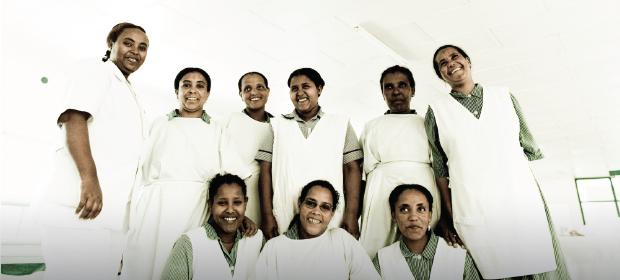Where We Work
See our interactive map


Nurses are on the front lines of health care—in hospitals, medical offices, health centers, schools, and homes--improving the lives of individuals and their families and communities. There are nearly 17,000,000 nurses and midwives worldwide providing approximately 90% of all health care.
We can’t reach the Millennium Development Goals (MDGs) without nurses. Yet, there are not nearly enough of them to deliver care to everyone: sub-Saharan Africa alone needs an additional 600,000 nurses to reach the MDGs.
But producing more nurses won’t happen overnight. It requires mid- and long-term strategies that range from increasing national expenditure on the health workforce to getting more girls in primary school, to strengthening the management capacity of nursing schools, to breaking down gender stereotypes that discourage men from joining the profession.
And increasing the number alone is not enough. We are far from optimizing the potential of our existing nursing workforce. Globally, nurses tend to be satisfied with their jobs and they frequently cite helping others, learning opportunities, and the appreciation their patients show as motivating factors. Yet nurses in countries as varied as Kenya, Taiwan, and the United States also experience similar challenges. Overwhelming workloads and long hours are taking their toll, and many nurses speak of exhaustion and stress, on top of too little pay and challenging working conditions, as the worst parts of the job.
These conditions can be extreme in underserved and remote areas, where a single nurse may provide health care for an entire community, acting as a default midwife or doctor in cases that extend beyond her or his training, because there simply is no one else there.
In areas of conflict, nurses and other health professionals are being targeted during attacks or forced to witness acts of terror, and then provide care for the victims and perpetrators.
At IntraHealth, we work hard every day so that more nurses in more countries will be present, ready, connected, and safe. All nurses deserve to be prepared and supported, and to have access to the information, training, and networks they need, so that they can focus on why they became nurses in the first place: to care for people.
Please join us in honoring the nurses and midwives in your life and those around the word. Take and share our short quiz, read more about how nurses are making a difference, and make a contribution that enables nurses and other health workers to offer hope for healthier lives.
QUIZ



